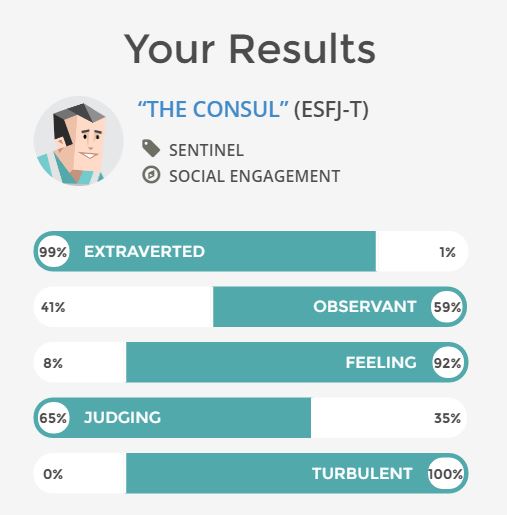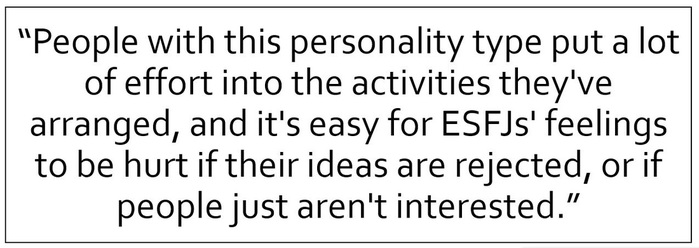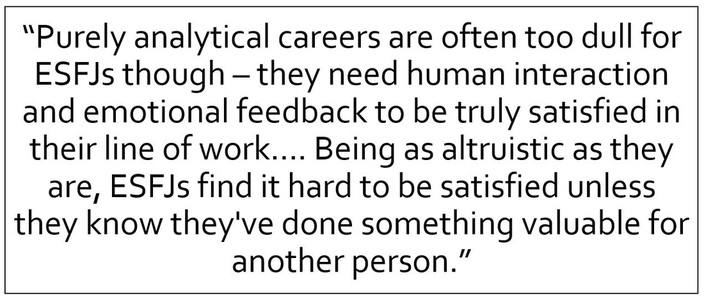“Hi, Anna.”
Many don’t put a lot of stock into Meyers-Briggs and other personality tests, but the majority seem to gush over how accurately the tests “get them.” I’m with the majority.
| My "ESFJ" means I am: Extroverted (energized by social interaction) rather than introverted. Observant (highly focused on the past and now), rather than intuitive (imaginative, curious). Feeling (sensitive, empathetic, focused on harmony) rather than thinking (prioritizing logic, efficiency). Judging (highly organized & valuing structure) rather than prospecting (improvisers). |
Many academics—that’s scientists and researchers who work at universities and other institutes— are the rarer INTJ or INTP personality types. That “iNtuitive-Thinking” combo makes a great academic—if you enjoy sitting around pondering the world’s great theories and making new ones of your own, this might be you. The “Introverted” piece is an added bonus that makes these types content to do this pondering more or less on their own. I don’t think this a stereotype as much as it is causal: academics want to think, or they wouldn’t be academics. It’s in their job description.
When I showed up to grad school, my goals were things like: do field work outside, learn about prairies, and do science with scientists. Which means I clashed more or less immediately with my tasks, which were to think about theories, come up with something new, do it all on your own, and work whatever hours you want as long as you graduate eventually.
In other words, I was asked to be an INTP.
I have been surprised by countless conversations with peers who couldn’t sleep at night because they were thinking (be it excitedly, or in a panic) about their research. I have never laid awake at night, pondering my dissertation research—or any research, for that matter. Instead, I’m constantly thinking about things like my relationships, what happened that day, that thing that happened four years ago, remember to send Mom a birthday card, we should really get the grad students together for happy hour this week, I hope so-and-so is doing alright, are my students learning anything. For a while, I thought this made me a bad scientist. Now I know it just makes me an S-F.
“Have you thought any more about x?”
“No, it hasn’t been a priority/I haven’t had the time.”
It feels weird. It feels weird to say “no, this specific work thing has literally not crossed my mind in the past week, except that I acknowledge that it’s been creeping upward from line #25 on my to-do list.” It’s weird to say “I didn’t make time to think.” But that’s what it is to me. I am perfectly capable of “thinking,” despite my “feeling” inclinations. I just have to put it on my to-do list when it’s something outside of my usual S-F realm.
When I do get around to having an idea, after I’ve sat down for some structured think-of-ideas time, I get thrown off if it doesn’t fly. I used to think this also made me a bad scientist, but it’s just my “F” showing.
The work of academics benefits their discipline, and it benefits themselves. There’s nothing wrong with desiring a little career advancement and recognition—it’s commonplace in all other fields, so it’s no surprise here in academia. The lucky ones do research with “broader impacts” and the even luckier do research that has immediate applicability to the world. For many, though, the hope is that their drop in the proverbial bucket contributes to what may eventually, somewhere, have some importance for the world.
Unfortunately, none of this motivates me. 99% extroverted is no joke. I get my energy from people.
One of my biggest strengths is that I am incredibly organized. Unfortunately, this “J” means I also value structure in my life, of which graduate school has none, and academia has little more. Many love this flexibility. My 9-5-working friends are jealous that I don’t have to use a sick day if I want or need to play hooky. The flip side of this is that no one cares if you come to work at all, and it’s not clear how long I could disappear before someone noticed and decided to stop paying me. I thrive on clear tasks and to-do lists, so if my goal for the day/month/year is to “figure out -x-“ or something equally abstract, I flounder.
This just means I have to really commit myself to deciding, what, exactly, I’m going to do in order to get something abstract done. For example, in order to complete to-do list item, “learn how to analyze my data,” I am planning to read through a relevant book and complete the practice problems. I need to be doing something in order to accomplish anything. And that’s okay.
True or false? ESFJs can’t be academics.
Definitely false! You can collaborate. You can put “think about -x-” on the to-do list, or better yet “write about -x-” or “read this book about -x-.” You can mentor and teach and be the social chair of your department to get your “people” fix. You can set up all your meetings to be at 9am so you have to show up and schedule your days task by task. ESFJs aren’t less intelligent. They just don’t operate well under an INTP framework, and can get lost if they don’t make the proper adjustments.
Can they cut it? Absolutely. Will they want to? Maybe not. But that’s okay. Those that abandon the academia ship will become the teachers, the communicators, the people-movers and the directors of the world. And if they can survive grad school, they can earn their science cred before moving on to bigger and better ESFJ things.
Have any of my readers had a completely different experience in academia? Is your lab full of ESFJs? Tell me about it in the comments!










